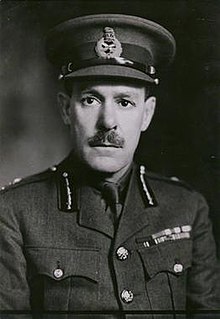
Henry Charles Beeching was a British clergyman, author and poet, who was Dean of Norwich from 1911 to 1919.

Lieutenant-General Sir Giffard Le Quesne Martel was a British Army officer who served in both the First and Second World Wars. Familiarly known as "Q Martel" or just "Q", he was a pioneering British military engineer and tank strategist.
The 7th Ryder Cup Matches were held November 1–2, 1947 at Portland Golf Club in Portland, Oregon, marking a resumption of the competition after a full decade. World War II forced cancellations from 1939 to 1945; the last competition was in 1937. The United States overwhelmed the British team, 11–1.
The 6th Ryder Cup Matches were held 29–30 June 1937 at the Southport and Ainsdale Golf Club in Southport, England. The United States team won the competition by a score of 8 to 4 points. It was the first time that the host team lost the competition and the second of seven consecutive wins for the U.S. side. The course had hosted the event four years earlier in 1933, Britain's last win until 1957.
William James Hughes was an Anglican bishop in the 20th century.

Widmerpool was a railway station serving Widmerpool in the English county of Nottinghamshire. It was situated on the Nottingham direct line of the Midland Railway between London and Nottingham via Corby.
The Star and Garter Hotel in Richmond was a hotel located in the London countryside on Richmond Hill overlooking the Thames Valley, on the site later occupied by the Royal Star and Garter Home, Richmond. The first establishment on the site, an inn built in 1738, was relatively small. This was followed by several other buildings of increasing size and varied design as the site changed from family ownership to being run by a limited company. Some of the rebuilding or extension work took place following fires that by 1888 had destroyed most of the original buildings. At various times architects were commissioned to build grand new buildings or extensions to take advantage of the famed view over the river and valley below, with the largest being the 1860s chateau block by E. M. Barry.
Frederick Richards Wynne was the 6th Bishop of Killaloe and Clonfert.
Nathaniel Alexander, was an Anglican bishop in Ireland during the first half of the 19th century.

The Clerkenwell explosion, also known as the Clerkenwell Outrage, was a bombing in London on 13 December 1867. The Irish Republican Brotherhood, nicknamed the "Fenians", exploded a bomb to try to free one of their members being held on remand at Clerkenwell Prison. The explosion damaged nearby houses, killed 12 people and caused 120 injuries. None of the prisoners escaped. The event was described by The Times the following day as "a crime of unexampled atrocity", and compared to the "infernal machines" used in Paris in 1800 and 1835 and the Gunpowder Treason of 1605. The bombing was later described as the most infamous action carried out by the Fenians in Britain in the 19th century. It enraged the public, causing a backlash of hostility in Britain which undermined efforts to establish home rule or independence for Ireland.
Arthur Frederic Clarke was an eminent Anglican priest in the late nineteenth and early twentieth centuries.

Sir Gordon Gordon-Taylor CB KBE FRCS FACS was a British surgeon
John Cotter Macdonnell was Dean of Cashel from 1862 to 1873.
Rathmines School was a secondary school in the suburb of Rathmines, Dublin: it opened in 1855 and closed in 1899. In all 2,190 pupils attended the school.
John Bradley Harbord was a Church of England priest and author.
John Cox Cox-Edwards (1839–1926) was a Church of England priest and chaplain in the Royal Navy who rose to be Chaplain of the Fleet from 1888 to 1899.
Charles James Stranks was a British Anglican priest and author.